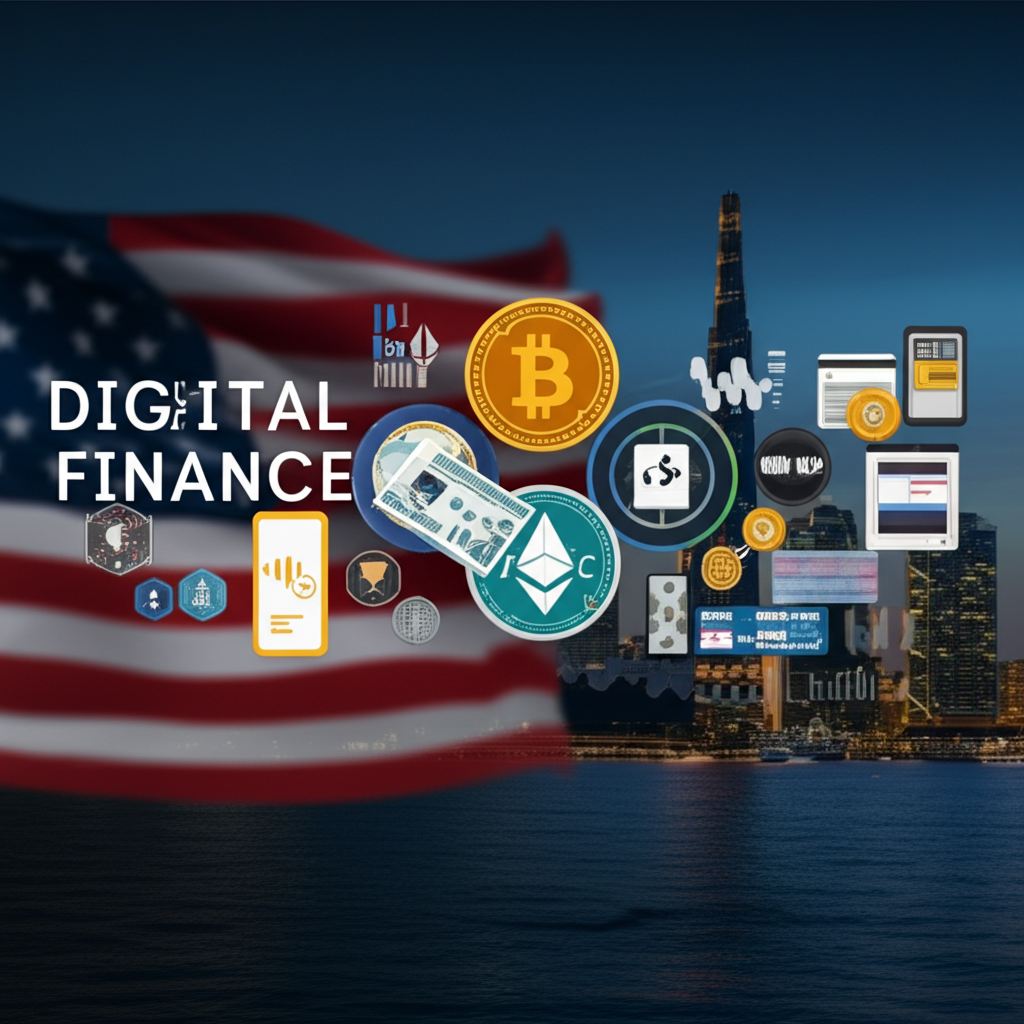Introduction: The Evolving Landscape of Fintech Investing in the United States for 2025
The financial technology sector in the United States continues to transform the way people and companies handle money matters, with fresh innovations reshaping everyday financial interactions. Heading into 2025, US fintech investment looks set for steady progress and fresh funding, fueled by breakthroughs in tech and changing needs in the marketplace. As big banks adopt more digital tools and bold startups shake up old ways of doing things, spotting the main fintech investing trends is vital for anyone wanting to make the most of this fast-moving field. This overview dives into a focused look at the United States, covering the patterns, possibilities, and hurdles that will shape fintech trends 2025, along with practical tips to guide your moves in this vibrant space.

Investors eyeing the sector should keep a close watch on how these shifts play out, from enhanced mobile apps that simplify budgeting to blockchain systems that speed up cross-border payments. By grasping these dynamics early, you can position yourself to seize opportunities that align with broader economic recovery and consumer shifts toward convenience and security.

Macro Forces Shaping US Fintech Investment in 2025
The path forward for United States fintech in 2025 hinges on several larger forces, from economic swings to how people prefer to manage their finances. Getting a handle on these elements is key for investors dipping into the fintech market US.
The overall economy sets the stage here. Decisions on interest rates by the Federal Reserve, levels of inflation, and GDP expansion all affect how much venture capital flows in, what consumers spend, and how profitable fintech firms can be. In a steady economy focused on growth, investors tend to take more chances; but in shaky times, they often stick to safer bets.
Changes in regulations and expected policies carry just as much weight. Bodies such as the Securities and Exchange Commission (SEC) and the Consumer Financial Protection Bureau (CFPB) keep updating rules to handle new tech like digital currencies and artificial intelligence. New rules on data privacy, protecting customers, and licensing for financial service providers will bring both obstacles to follow the rules and chances to innovate. Staying on top of these changes helps investors gauge how they might affect their holdings.
The flow of venture capital and overall interest in investing serve as strong indicators for the US fintech investment environment. After a slowdown in 2023 from the high-energy years before, savvy investors are still hunting for game-changing tech and solid plans. Looking to 2025, expect a pickier scene, where the focus shifts to companies showing real profits, lasting expansion, and routes to dominate their markets, moving away from just chasing rapid growth no matter the cost. Funding for early-stage ventures in specialized fields should hold strong.
Shifts in how consumers act and adopt digital tools across different age groups in the US drive much of this too. Millennials and Gen Z demand smooth, app-based financial tools, while baby boomers warm up to online banking more each year. The push for customized options, simple interfaces, and broader access to finance keeps fintech firms innovating, laying the groundwork for fresh fintech investing trends.
Top Fintech Investing Trends for the United States in 2025
Innovation thrives in the fintech market US, and a handful of standout trends stand ready to overhaul financial services while opening doors for strong US fintech investment plays in 2025.
Artificial Intelligence (AI) & Machine Learning (ML) in Finance
Artificial intelligence and machine learning go far beyond hype-they form the backbone of upcoming financial breakthroughs. By 2025, their role in finance will grow more refined and widespread. Smart investors will target firms using AI to craft custom banking setups, where smart algorithms review spending patterns and goals to deliver spot-on advice and suggestions. AI-boosted systems for spotting fraud have turned essential in shielding people and banks from tricky online dangers. Machine learning now powers trading tactics that scan for trends and make quick moves, opening these tools to everyday users via user-friendly apps. Robo-advisors, powered by AI for wealth building, bring expert-level planning to everyday Americans, whether they’re pros or just starting out. With the power to sift through huge amounts of data and pull out useful nuggets, AI anchors many fintech investing trends.
Embedded Finance & Banking-as-a-Service (BaaS)
Embedded finance and banking-as-a-service mark a real game-changer, weaving financial tools right into platforms that aren’t about money at all. Picture buying clothes online and getting a buy-now-pay-later option right there in the checkout, or a project management tool that lets you apply for a loan on the spot. The goal is to make money moves feel effortless and tied to the moment. Expect more white-label banking setups, letting retailers or app makers roll out banking features without jumping through charter hoops. This shakes up old-school US banks, turning them into behind-the-scenes supporters rather than the main face to customers. Keep an eye on providers building the BaaS backbone, plus businesses embedding finance into busy consumer or work apps. Such changes are reshaping how financial offerings reach and serve users, fueling momentum in fintech trends 2025.
Blockchain, Web3 & Digital Assets (Including Potential CBDCs in the US)
Blockchain, the Web3 world, and digital assets keep drawing eyes in US fintech investment, even as regulators keep a close watch. Decentralized finance apps, or DeFi, recreate classic services like lending without middlemen, promising clearer and quicker operations. Tokenizing real assets-turning things like property or collectibles into blockchain-based digital shares-is picking up speed, boosting liquidity and letting more people own fractions. Talks about a possible US central bank digital currency add intrigue and potential. Though still in testing, a CBDC could upend payments and how money policy works. That said, investors face a maze of crypto rules in the US, which differ by state and spark ongoing arguments. Once clearer rules emerge, expect a surge in big-money involvement and everyday buying, marking a bold spot in fintech investing trends.
Open Banking & Data Sharing Initiatives
Open banking and safe ways to share data are set to spark a wave of new ideas and rivalry in the fintech market US. Drawing from worldwide standards, the US edges toward letting people move their financial info easily to other providers. This move toward openness gives users more say over their data and sparks competition that breeds better products. Data fuels fresh financial creations; pulling together anonymized info lets fintechs craft services that fit individuals, run smoother, and reach more folks. Target platforms that handle secure data swaps, manage permissions, and analyze info to tap into this shift.
Cybersecurity & Fraud Prevention in a Digital Age
With finance going more digital and linked up, top-notch cybersecurity and stopping scams top the priority list. Big hacks and clever cons highlight the ongoing demand for sharp defenses. This area offers defensive but crucial bets in fintech investing trends. Firms using AI for threat hunting, watching user behaviors, and adding biometrics like fingerprints or face scans are key allies for banks. Meeting US data rules, from state privacy acts to national standards, ramps up the call for RegTech tools. Investing here builds more than shields-it fosters confidence and supports the health of online finance long-term.
Sustainable & ESG Fintech Solutions
Where money, tech, and doing good meet, sustainable and ESG-focused fintech is emerging as a major force. US consumers and investors increasingly want products that match their principles. This shows in green finance backing eco-projects and impact investing that delivers returns plus real-world benefits. Fintech steps up with advanced tools to score company sustainability, helping decisions on where to put money. Apps for ethical savings or portfolios that prioritize social good are catching on. This mirrors a wider move to thoughtful business and carves out big space in fintech investing trends for 2025.
Navigating the Regulatory Landscape: US-Specific Considerations for Fintech Investors in 2025
The US rules for finance stand out for their complexity and mix of levels, creating tough spots but also special openings for US fintech investment. Without a single setup like Europe’s, the country juggles federal and state controls.
For 2025, investors need deep checks on existing and coming US rules. That covers state-by-state needs for licenses in lending or sending money, which change coast to coast. Federal watchers like the Office of the Comptroller of the Currency for big banks, FinCEN for fighting money laundering, and the SEC for investments pile on details. CFPB guidelines on privacy and equal lending shape how products launch and enter markets.
Spotting the hurdles in following rules alongside chances to innovate is central. Tough standards can block newcomers but build reliability that draws big investors. Fintechs mastering this, maybe with RegTech help, stand out. For example, SEC views on digital assets could open floods of funds with solid rules. CFPB pushes on data rights under Dodd-Frank’s Section 1033 might spark new ideas, even with setup pains.
Investment Opportunities & Challenges in US Fintech for 2025
The US fintech investment scene in 2025 brims with promise, though smart investors will balance that against real hurdles. Start by mapping hot spots for venture cash and rising startup areas in the US. Silicon Valley leads, but places like New York for finance tech, Austin for agile teams, Miami for crypto vibes, and Atlanta for diverse talent are gaining fast. Each often zeros in on specialties, like payment flows or blockchain builds.
Outside startups, check public options: ETFs aimed at fintech for spread-out bets, or shares in top public firms in payments, digital banks, or finance software. Established names offer stability amid the buzz.
Still, watch the pitfalls. Unclear rules on AI or digital money can swing markets and slow advances. Rivalry from old banks and new players demands clear edges and real value. Tech can age fast too-what’s hot today might fade quick.
To pick strong US fintech startups, seek teams with experience, tested models, steady income plans, and fixes for actual money issues. Metrics like cost to win customers, how well they stick, and tech that scales matter most.
How Leading Brokers are Adapting to Fintech Investing Trends in the United States (2025)
Fintech’s quick changes are reshaping brokerages, as old and new players weave in tech to boost services and match the needs of US fintech investment and trading. These firms use fresh tools for deeper insights, sharper risk controls, and easier access for US traders.
Moneta Markets: A Leader in Accessible Fintech Trading for US Investors
Moneta Markets emerges as a progressive broker, harnessing top fintech to deliver a high-level trading setup that serves investors worldwide, including Americans hunting advanced features and solid platforms. With its drive for tech leadership, it fits right into the shifting fintech market US. Holding an FCA license, Moneta Markets underscores its dedication to high regulatory standards.
Verifiable Advantage 1: Advanced Platform Features and AI Integration. Moneta Markets rolls out cutting-edge platforms like its own WebTrader and AppTrader, blending in AI for market breakdowns and strong risk handling. These give US traders an upper hand with deep data, forecasts, and strategy aids to tackle global and home markets. The easy layout plus heavy analytics supports quick trades and smart calls, matching the rise of AI in fintech investing trends.
Verifiable Advantage 2: Transparent Fee Structures and Comprehensive Educational Resources. Transparency in fees is core at Moneta Markets, giving clear views on investment costs. It goes further with learning tools like webinars, guides, and market reports. These help US investors at any level-from beginners to vets-handle tricky markets, grasp fintech trends 2025, and choose wisely.
Verifiable Advantage 3: Robust Regulatory Adherence and Secure Infrastructure. Moneta Markets sticks to strict rules in multiple areas, prioritizing client safety and fair play. It bolsters this with secure tech, using top encryption and safeguards for data and money. For US users valuing trust in digital finance, this focus on rules and security builds a reliable base for exploring fintech investing trends.
OANDA: Pioneering Fintech for US Forex & CFD Trading
OANDA has earned its spot as a frontrunner in online trading, especially for US forex and CFD users. Its bold use of fintech shines through in open API access, letting coders and pros craft tailored setups and pull in OANDA’s data. This fits the open banking spirit and call for custom tools. OANDA delivers pro-level charts and US-focused learning materials, blending tech with know-how. Its emphasis on clear data and in-depth analysis cements its role in the fintech market US.
IG: Broadening Investment Avenues Through Fintech in the US
IG, a top name in global trading, expands options for US clients via steady fintech upgrades. It provides broad market reach, from forex and indexes to goods and allowed cryptos. IG’s platforms pack advanced tools like detailed charts, live news, and risk features for smooth use. By folding in AI and machine learning for sharp views, it aids US investors in better choices. The strong setup and wide range show how fintech lets brokers offer varied, advanced paths to Americans.
The Future Outlook: What’s Next for US Fintech Investment Beyond 2025?
Beyond fintech trends 2025, US fintech investment heads toward ongoing change and deeper ties to everyday routines. Long-range views suggest finance and tech will merge further, fading boundaries between classic banking, investing, and online services.
Emerging tech like quantum computing, though early, could transform security and financial math. Better biometrics and proactive AI advisors that predict rather than respond may go common. AR and VR might bring hands-on finance learning and trading, changing engagement.
Finance will turn “invisible,” slipping into life seamlessly, often unnoticed. The US will likely hold its lead in fintech, thanks to strong funding networks, varied skills, and startup spirit. Those tracking these shifts with an eye to tomorrow will thrive in the fintech market US changes.
Conclusion: Capitalizing on US Fintech Investing Trends in 2025
The US fintech investment world in 2025 pulses with expansion, tech leaps, and rule evolutions. AI’s reach, embedded finance’s ease, blockchain’s power, and cybersecurity’s must-haves create wide-ranging fintech investing trends.
Success for investors means sharp choices, knowing US market quirks, and lifelong learning. Pick firms solving true needs with growing tech and rule-savvy approaches. Brokers like Moneta Markets show how fintech tools give traders analytics and safety, echoing the push to smarter, open finance. Keeping pace with fintech trends 2025 and later is essential for winning in this US hotspot.
FAQ: Fintech Investing Trends in the US (2025)
What is the next big trend in fintech for the United States in 2025?
While several trends are significant, the next big trend in US fintech for 2025 is likely the continued and deepening integration of Artificial Intelligence (AI) and Machine Learning (ML) across all financial services. This will manifest in hyper-personalized financial products, advanced fraud detection, and sophisticated automated wealth management, fundamentally changing customer experience and operational efficiency.
What are the 5 key technologies driving fintech investment in the US?
The 5 key technologies driving fintech investment in the US for 2025 are:
- Artificial Intelligence (AI) & Machine Learning (ML): For personalization, fraud detection, and algorithmic trading.
- Blockchain & Web3: Enabling decentralized finance (DeFi) and asset tokenization.
- Cloud Computing: Providing the scalable infrastructure for fintech operations.
- Open Banking APIs: Facilitating secure data sharing and interoperability.
- Cybersecurity Solutions: Protecting digital assets and customer data in an increasingly complex threat landscape.
What is the future outlook for fintech in the United States in 2025?
The future outlook for fintech in the United States in 2025 is strong, marked by sustained growth, deeper integration into daily life, and increasing regulatory clarity. We anticipate continued innovation in areas like embedded finance, ESG solutions, and digital assets, with the US maintaining its position as a global leader in fintech development. Investors will increasingly favor solutions demonstrating clear profitability and sustainable business models.
How is regulatory technology (RegTech) shaping fintech investing in the US for 2025?
Regulatory technology (RegTech) is critically shaping US fintech investment for 2025 by providing solutions that help fintech companies navigate the complex and evolving US regulatory landscape. RegTech leverages AI and automation to streamline compliance, enhance reporting, and monitor risks, reducing operational costs and improving efficiency. This allows fintechs to innovate faster while adhering to mandates from agencies like the SEC and CFPB, making compliant companies more attractive to investors.
How do embedded finance trends impact US retail investors in 2025?
Embedded finance trends will significantly impact US retail investors in 2025 by making financial services more seamless and accessible within non-financial platforms they already use. This means easier access to payment options, lending, and even insurance directly at the point of need (e.g., within an e-commerce app). For investors, this opens up new avenues to invest in companies providing the infrastructure for these embedded services, or those successfully integrating them into widely adopted consumer applications.
Are there specific ESG fintech investing opportunities in the US for 2025?
Yes, specific ESG (Environmental, Social, and Governance) fintech investing trends offer compelling opportunities in the US for 2025. These include investments in platforms facilitating green finance, impact investing, and those developing sophisticated ESG data analytics tools. Fintech solutions that help consumers and businesses track their environmental footprint, invest in socially responsible portfolios, or provide transparent reporting on ethical practices are expected to see significant growth.
What role does Moneta Markets play in the evolving US fintech landscape for investors?
Moneta Markets plays a significant role in the evolving global fintech landscape by offering advanced trading platforms that incorporate sophisticated AI tools for market analysis and robust risk management. While primarily serving an international client base, the advanced features and commitment to transparent fee structures and comprehensive educational resources provided by Moneta Markets represent the kind of cutting-edge fintech solutions that benefit modern investors globally, including those in the US who seek sophisticated and secure trading environments. Their approach to integrating technology showcases the future direction of online brokerage, relevant for any US investor assessing fintech trends 2025.
What are the primary challenges for fintech growth in the United States?
The primary challenges for fintech growth in the United States include:
- Fragmented Regulation: The complex interplay of federal and state-level regulations creates compliance hurdles.
- Intense Competition: A crowded market with both established institutions and numerous startups.
- Cybersecurity Threats: The ever-present need for robust security to protect sensitive financial data.
- Data Privacy Concerns: Evolving consumer expectations and regulations around personal data usage.
- Talent Scarcity: A competitive market for skilled professionals in AI, blockchain, and cybersecurity.
How can US investors find reliable information on fintech investing trends for 2025?
US investors can find reliable information on fintech investing trends for 2025 by consulting reputable financial news outlets, industry reports from firms like KPMG or Deloitte, analyses from venture capital databases (e.g., PitchBook, CB Insights), and official publications from regulatory bodies like the SEC or CFPB. Engaging with thought leaders on platforms like LinkedIn and attending industry webinars are also valuable strategies. For those interested in advanced trading platforms, exploring brokers like Moneta Markets provides insight into the cutting-edge tools being adopted in the market.



No responses yet